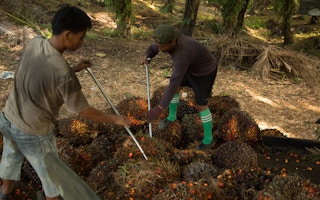Malaysia may ban further expansion of oil palm plantations in an effort to improve the oilseed’s reputation abroad, reports Bloomberg.
In an interview Friday, Minister of Primary Industries Teresa Kok told Bloomberg that the prime minister’s cabinet will weigh a proposal to cap Malaysia’s palm oil estate at 6 million hectares (14.8 million acres), an area just 2.5 per cent larger than currently planted. However the proposal would also need to win support from state governments, which often govern land use allocation.
Kok said that Malaysia could continue to increase palm oil production despite the cap by improving yields of existing plantations.
The proposed move comes in response to criticism over palm oil’s link to large-scale deforestation in Southeast Asia, an issue that has hurt palm oil’s uptake as a biofuel feedstock in Europe at a time when a global palm oil glut has cut prices to the lowest levels in more than a decade.
The Malaysian and Indonesian governments have conducted major public relations and lobbying campaigns in support of palm oil, while also shoring up domestic demand via biofuels mandates, but haven’t been able overcome scientific studies that show the crop is a major driver of rainforest and peatlands conversion, and therefore a significant source of greenhouse gas emissions, undermining industry sustainability claims for palm oil-derived biodiesel.
Environmentalists have also linked some palm oil companies to land grabbing, human rights abuses, poor labor standards, and endangerment of charismatic animals like orangutans.
The palm oil industry has tried to police itself with the establishment of voluntary standards like the Roundtable on Sustainable Palm Oil (RSPO), an eco-certification initiative, and the adoption by some companies of policies — zero deforestation, peatlands, and exploitation (ZDPE) commitments — that bar conversion of natural forests and peatlands, but the sector’s image remains tarnished by actors who have continued with expansion on a business-as-usual course.
Still, even if Malaysia does approve the 6 million hectare cap, it may not be enough to address its reputational issues given many Malaysian palm oil companies are active internationally, especially in southeast Asia, where they continue to convert forests, peatlands, and areas claimed by traditional and indigenous communities.
Some observers have noted that Malaysia could eventually be pressured by oil palm expansion in countries like Brazil, which have vast areas of land suitable for the crop that were long ago deforested for low-value cattle pasture. Converting those areas for palm could dramatically increase palm oil supply without deforestation.
This story was published with permission from Mongabay.com.










